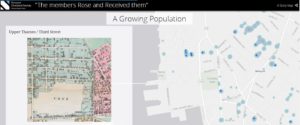Digital Resource Guide — Rhode Island’s African American History
Rhode Island Department of Education (RIDE) Resources on African American...
With this page, the Newport Historical Society seeks to bring the history of people of Native American and African descent in Rhode Island into a more public light. In addition, it seeks to highlight the role that Newport citizens played in the history of the transatlantic slave trade of the 18th and 19th centuries, and in the institution of slavery in the Americas.
The first European settlers on Aquidneck Island purchased the right to settle here from the native inhabitants in 1638, with Newport being founded the following year. Despite an agreement stipulating that those first residents would vacate the island, there is evidence in the historical record that that native peoples continued to actively engage – socially and economically – with the new European settlers. This digital exhibit highlights some of this evidence in the historical record, including documents and objects.
Please enjoy this illustrated Black History Month lecture, “Benevolence and Success in the Era of Slavery: Duchess Quamino and William Ellery Channing,” presented by Akeia de Barros Gomes, Ph.D., anthropologist, senior curator of Maritime Social Histories at the Mystic Seaport Museum, and Visiting Scholar at the Slavery and Justice Center at Brown University. Here, Dr. de Barros Gomes explores the life and relationships of Duchess Quamino of Newport, the formerly enslaved nanny and baker to the family of William Ellery Channing, a Unitarian minister and prominent Newport citizen.
This lecture was presented live at Channing Memorial Church in February 2022, through association with the Rhode Island Slave History Medallions project.
Rhode Island Department of Education (RIDE) Resources on African American...
This is a guest blog post by Jenny Sullivan, MA...
This is a guest blog post by Rebecca Farias, MA...
This is a guest blog post by Sam Dinnie (they/them),...
This is a guest blog post by Lindsey Smith (she/her),...
This is a guest blog post by Amelia Yeager (she/her),...
This is a guest blog post by Amelia Yeager (she/her),...
The Walker Building, present-day 9 & 11 Bridge Street is...
Zoe Hume, MS graduate, Florida State University, is one of...
Zoe Hume, MS graduate, Florida State University, is one of...
Alexander Bice, MA graduate, Northeastern University, is one of the...
Guest post by Kristin Uscinski, co-host of the podcast ‘Footnoting...
Hampton Smith, Ph.D. student, MIT, is one of the 2021...
Hampton Smith, Ph.D. student, MIT, is one of the 2021...
Alexander Bice, MA graduate, Northeastern University, is one of the...
Hampton Smith, Ph.D. student, MIT, is one of the 2021...
Zoe Hume, MS graduate, Florida State University, is one of...
Alexander Bice, MA graduate, Northeastern University, is one of the...
This is a guest blog post by Laura Bacon, BA,...
This is a guest blog post by Maureen Iplenski, MA/PhD...
This is a guest blog post by Maureen Iplenski, MA/PhD...
Uncovering other possibilities from the past. By Tara A. Bynum.
Phillis Wheatley was a celebrated poet and the first African-American author of a published book of poetry; she was also a formerly-enslaved woman living in 18th century Boston. In this essay, Tara A. Bynum, an assistant professor of English and African American Studies at the University of Iowa, writes about her experience of Phillis Wheatley’s humor, faith, and character through reading her personal correspondence.
 This social history mapping project focuses on Newport’s mid-to-late nineteenth century African American community, using data compiled from from local church records, census documents, and maps from the NHS collection. Click the link below to explore the project.
This social history mapping project focuses on Newport’s mid-to-late nineteenth century African American community, using data compiled from from local church records, census documents, and maps from the NHS collection. Click the link below to explore the project.